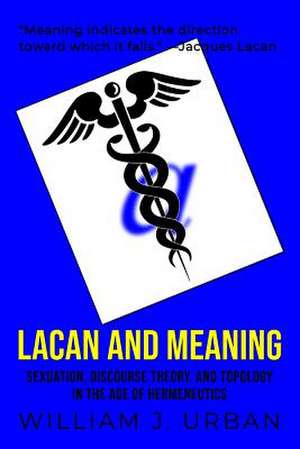Lacan and Meaning
Autor William J. Urbanen Limba Engleză Paperback
Broadly speaking, the majority of books on Jacques Lacan focus on the earlier periods of his career. They also tend to target the psychoanalytic clinical community, or else discuss his work in various political, social, and cultural contexts. But in almost all cases these books refrain from a detailed exegesis of his actual texts. They instead prefer to comment on his theoretical apparatus as a whole before turning to its practical implications.
Lacan and Meaning positions itself against this grain. Firstly, it closely analyzes some half-dozen key Lacanian texts. This analysis is organized under a single thematic - the question of meaning - in order to advance the reader's understanding of the trajectory of Lacan's thought across his entire career, as well as to promote the book's thesis that the field of meaning can be suspended. Accordingly, an initial chapter takes up the hermeneutical tradition from Flacius onward. This is then supplemented by a chapter which surveys phenomenological, structuralist and aesthetic theories of meaning and their differing methods of textual analysis. Together these two chapters provide a unique context for the sustained analysis of Lacan's texts which begins in the third chapter, an analysis that forms the bulk of the book's content. This contextualization potentially widens the book's appeal to any scholar wishing to explore his relationship to those textual objects he interacts with on a daily basis. And because this book assumes the reader has little to no familiarity with Lacan, the reader will find patient explanations of the basics of his theories before slowly being led up to the more difficult theories of his late years. Again the argument is that Lacan has something to offer all scholars. His work is not just reserved for psychoanalysts.
It is with his late theories that the serious student of Lacan will find the book's most original contribution. For in the fourth chapter a detailed account is provided of how Lacan derived his infamous formulae of sexuation from Aristotelian logic. These formulae are then extensively discussed against the backdrop of interpretive theory and textual analysis, showing how these formulae capture much more than just the difference between the sexes. Strikingly, this difference is also found to run through meaning itself, something the final chapter aims to demonstrate. It does this by amalgamating three key components of late-Lacan: sexuation, discourse theory and his use of topological spaces. This amalgamation is a first in the literature. But this amalgamation is not just useful in demonstrating the book's thesis. It further suggests how seemingly divergent aspects of late-Lacanian theory can be made to work together.
From the back cover:
What is the essential nature of meaning?
This book answers by examining interpretive theories from the past and present. It finds that an historical struggle with meaning has been underway since the Reformation, a struggle that reaches crisis proportions in the 20th century. On the one hand, this crisis is mollified by Heidegger's hermeneutical phenomenology, which argues that we are always already in a meaningful relationship to the objects of the world. On the other hand, this crisis is exacerbated when phenomenology, structuralism, and aesthetic theory directly make meaning into an object of study.
These historical developments culminate with the psychoanalyst Jacques Lacan, whose non-hermeneutical phenomenology delimits a cause of meaning said to be closely linked to the core of subjectivity. Intriguingly, Lacan's work reveals meaning to be sexual in nature. By integrating his notion of sexual difference with his work in discourse theory and topology, this book demonstrates how the subject's struggle with meaning can be suspended.
scholars with financial difficulties, email the author directly, a PDF of this book wiPreț: 113.49 lei
Nou
21.72€ • 22.59$ • 17.93£
Carte tipărită la comandă
Livrare economică 14-28 aprilie
Specificații
ISBN-10: 1530345502
Pagini: 208
Dimensiuni: 152 x 229 x 11 mm
Greutate: 0.29 kg
Editura: CreateSpace Independent Publishing Platform
